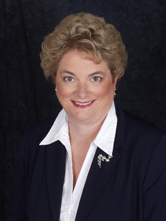Patients who are paralyzed, extremely sick or so poorly nourished they can’t change positions in bed are at an increased risk for developing pressure ulcers.
Pressure ulcers -commonly referred to as pressure sores or bed sores – happen when the skin breaks down after being in one position too long without shifting weight. They are treated with special cushions, mattresses, increased protein in the diet, dressings, and in serious cases, surgery.
 “When you sit or lay in one position, the pressure against the surface you’re laying on pushes the blood out of the tissues – tissues are starved of blood due to pressure,” said Joyce Black, Ph.D., UNMC College of Nursing associate professor and expert on pressure ulcers. “Changing positions at least every two hours will allow blood to get to places that are starved.”
“When you sit or lay in one position, the pressure against the surface you’re laying on pushes the blood out of the tissues – tissues are starved of blood due to pressure,” said Joyce Black, Ph.D., UNMC College of Nursing associate professor and expert on pressure ulcers. “Changing positions at least every two hours will allow blood to get to places that are starved.”
Dr. Black recently was appointed as president of the National Pressure Ulcer Advisory Panel (NPUAP). The organization is focused on public policy, research and a new form of pressure ulcers called deep tissue injury. It also educates health professionals on the issue nationally and internationally.
A medical-surgical nurse, Dr. Black developed an interest in pressure ulcers while at the Mayo Clinic 25 years ago. “Pressure ulcers are attributed to activities that nurses do, so to some degree, are preventable,” she said.
Even though the two-hour guideline has been around for years, patients still get bed sores for a variety of reasons.
“Hospitalized patients are sicker today than 10 years ago, and there’s probably risks in some patients we cannot prevent,” Dr. Black said. “In addition, the shortage of nurses has made an impact on how often patients are turned.”
Dean of the College of Nursing Virginia Tilden, D.N.Sc., is proud that Dr. Black’s expertise has been recognized with the appointment. “This organization is a leading voice for education and research in pressure ulcer prevention and treatment,” Dr. Tilden said. “Pressure ulcers are a common, but very serious debilitating condition for many patients.”
Dr. Black has been involved with the NPUAP since 1998, and has served in various roles. She also is a member of the Wound, Ostomy and Continence Nurses Society, the Wound Healing Society, the Midwest Nursing Research Society, American Nurses Association, Nebraska Nurses Association and numerous other nursing and academic nursing organizations.
She earned a bachelor’s degree in nursing from Winona State University in Winona, Minn., and a master’s and doctoral degree from the UNMC College of Nursing.
From 1972 to 1979, she worked at Saint Mary’s Hospital in Rochester, Minn., where she ultimately served as head nurse of burn, intensive care and plastic surgery and respiratory units. From 1981 to 1982, she served as a consultant to Bishop Clarkson Memorial in Omaha and in 1982 she took her first position as nursing instructor at the UNMC College of Nursing.